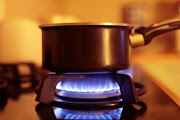
Summer is in full swing and the parks are busy, full of visitors enjoying the sights and employees working hard to keep them safe and informed. In the hustle and bustle of park life, it's often easy to get distracted when you're back at home in the kitchen. Because cooking is the leading cause of home fires and home fire injuries, keeping safe in the kitchen is just as important as keeping visitors safe in the parks.
Sources of cooking fires are varied and can range from grease fires to microwave fires, fires caused by overloaded circuits, or even the household cat accidentally knocking over the hot plate. To keep safe while cooking, practice the following tips:
- Plug microwave ovens, hot plates, coffee pots, crock pots, and other cooking appliances directly into an electric outlet. Never use an extension cord for cooking appliances, because this can overload the circuit and cause a fire.
- Cook only when alert, not sleepy or drowsy from alcohol or medicine. Do not let distractions, such as guests or the television, take you away from the task at hand.
- Move anything that catches fire--pot holders, oven mitts, wooden utensils, paper bags, food packaging--away from the stovetop.
- Keep pets from climbing on cooking surfaces to prevent them from knocking over cooking appliances or accidentally turning them on.
- Avoid loose clothing, especially long sleeves that can contact gas flames or an electric burner and catch fire.
- Set a timer to remind yourself of a meal in the works.
- Unplug appliances after use.
Imagine that despite your best efforts, a fire still develops in your kitchen. Now what?
- For a grease fire, smother the fire by carefully sliding a cover or cookie sheet over the pan and turning off the burner. Never douse the flames with water, which could actually spread the fire.
- For a microwave fire, keep the door closed and turn the unit off.
- For an oven fire, keep the door closed and turn the oven off.
If you cannot immediately extinguish the fire with these methods, leave your home immediately, closing doors behind you to slow the spread of fire, and call 911.
Fire Info for You
Employees
- Ask park managers about restrictions or guidelines on the use of specific cooking appliances, such as hot plates, in park housing.
- Check out the Cooking Safety Checklist from the National Fire Protection Association.
- Watch this National Fire Protection Association video NFPA Safety Tips -Cooking Safety, on YouTube.
Park Leadership
Ensure smoke detectors and fire alarm systems are installed and working in park housing units. Change batteries twice a year, when clocks are changed in the spring and fall.
Take Action
Before a kitchen fire develops, make sure you are protected:
- Don't remove or unplug batteries from smoke detectors. Smoke detectors double your chance of survival in a fire.
- Don't hang clothing or decorations from or store items 18" or less from sprinkler heads.
- Buy a fire extinguisher for your kitchen or locate the closest fire extinguisher in government housing.
NPS Fire Facts
Park engine companies respond to a fair amount of calls, especially during the summer season when dormitories are full, for cooking-related emergencies. Here's a peek at just a few:
- An employee comes home and places several pieces of chicken in the oven and then passes out from alcohol consumption. The chicken begins to burn, creating smoke that sets off the fire alarms. The park engine company responds and ventilates the residence.
- A mother awakens to an alarm in the middle of the night. Firefighters find a slice of bread burning in the toaster. Foul play is suspected of the family's cat, which likes to climb kitchen counters.
- Firefighters respond to an alarm in the park's bookstore, where they find popcorn burning in a microwave.
- Firefighter actions likely prevent a stovetop fire from spreading, while the resident, suspected of intoxication, is difficult to arouse in the next room.
- Food left cooking on the range creates enough smoke to activate the smoke detectors in a residence. The occupant started cooking and fell asleep. Firefighters ventilate the house.
- Bacon frying on the stove causes a smoke alarm to activate in park housing. A quick response prevents a fire from developing.
While working and living in a park myself, my parents came for a visit and decided to cook up a batch of homemade Italian meatballs in a fry pan. While transferring the cooked meatballs to a dish, paper towels lining the dish caught fire, scaring all involved. Luckily, we were able to smother the fire and save the meatballs for a great meal.
All of these scenarios, potentially life threatening, could have been prevented.
Last updated: October 28, 2016
